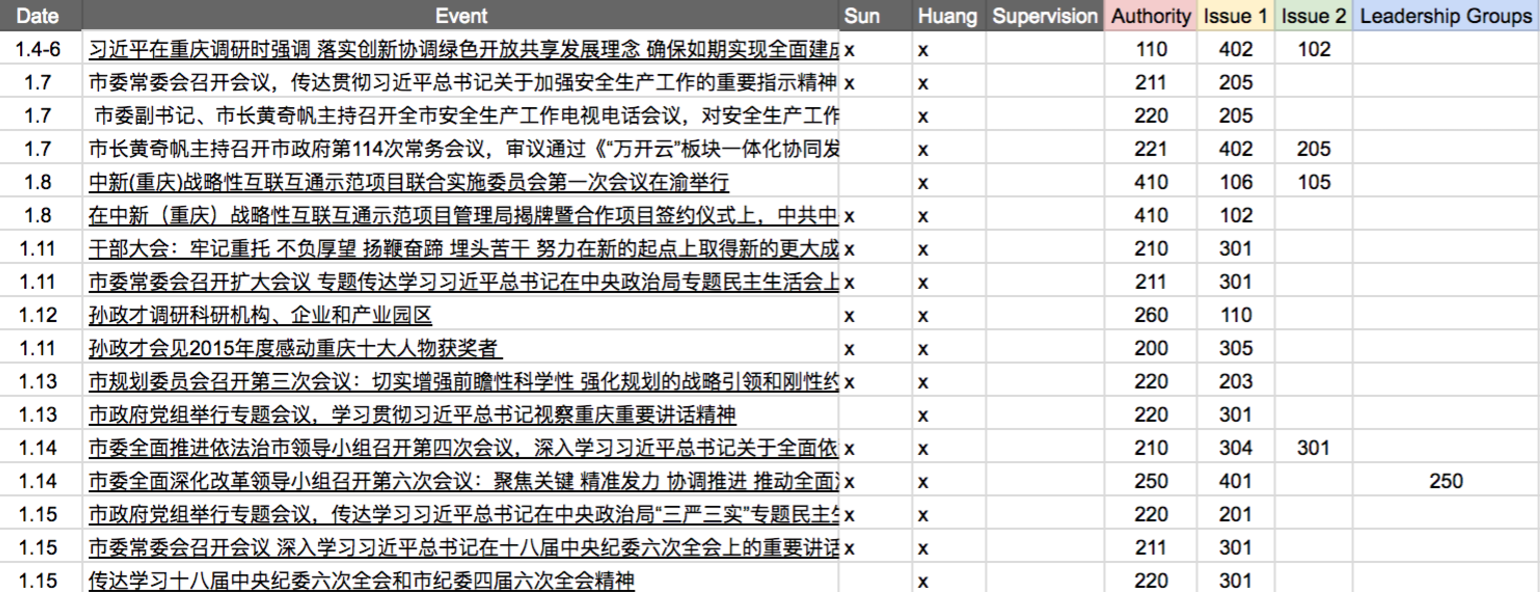Economic growth in China is always a political issue. During the past decades, China’s GDP increased immensely and so did the standard of living of the Chinese people. Mega cities, subway webs, high-tech industries, real estate weaved together a picture of miracle economic development. Explanations of such growth focus mainly on the role of free market, liberalization, privatization and various economic factors. My Ford project with Professor Fubing Su, however, attends to the political mechanism behind China’s economic performance. We hope to discern the role of and the dynamics in China’s unique dual leadership system—collective leadership of the party secretary and the governor, and pay special attention to how do the everyday activities of the provincial leaders affect China’s economic achievement.
Our project is also an effort to challenge and improve the “Tournament Thesis.” The Thesis argues that the Chinese government is a merit-based hierarchical system in which local officials are promoted based on their competence. An official will orient his/hers career accordingly to the central’s expectation which includes economic development. The officials thus enter a tournament where they compete to develop the local economy and thus propel a national-wide economic growth. The Thesis, however, oversimplifies the political mechanism. Other factors, for instance loyalty and personality, will also affect political promotion. If competency is not the only influential factor, how do officials actually react to the central’s requirement? Under the dual leadership system, is the relationship between the two provincial officials competitive, collaborative, or even more complex and how do their relationship affect the local economy?
With these questions in mind, we start from Chongqing, one of China’s municipalities. Chongqing is a mega city with 30,000,000 population and also a striking site of economic development. We browsed the official website of the Chongqing government for reports on events which Chongqing’s party secretary and mayor attended in 2016 and 2017. To review the massive amount of information, we created two sets of codes: Authority and Issue. Authority codes signify power relationship in an event; Issue codes generally categorizes what an event is about.
After coding all the reported events during 2016 and 2017, we briefly analyzed the raw materials and created two sets of data. One shows a general time distribution of the officials on each type of events (economic, social, political and comprehensive); while the other one indicates the level of interactions between the officials and different governmental and social sectors.
These data and observations have various possible applications. They can support a cross-temporal analysis of Chongqing to help understand how does the focus of the provincial government change over time and what does such shift mean. For instance, we found that the percentage of economic events in 2016 greatly exceed that in 2017, with an shifting concentration on political events in 2017. Events such as meetings with foreign companies, economic corporations with local, national and foreign companies and investments were cut by half in 2017 compared to the previous year. Though the central government still emphasized on developing the national economy, actual economic events in Chongqing decreased. Further explanation for this counter-intuitive situation needs more detailed background and knowledge on governmental policies, but our data provide an entry point to make sense of the current big picture.
This Ford Project is only a part of Professor Su’s research which will gather data from all 34 provinces in China across more than 5 year. With more research on different provinces, we could conduct inter-local analysis and see if the change in Chongqing from 2016 to 2017 a national phenomena or a distinct occasion. Other possible research focus can explore the the leadership dynamics in the Chinese government, changing of leadership pairs, State-business relationship and more.
After completing our research on Chongqing, Prof. Su and I went back to China and visited Central China Normal University. We met with Professors from the Institute of Chinese Rural Studies and learnt about their programs and achievements. I found it crucial to travel back to China and collaborate with local universities in order to have a sense of the current political environment and what is actually happening at the local. Poverty reduction, for instance, the top emphasized social issue in Chongqing in both 2016 and 2017, is a national-wide effort to support the poor. Latest policies and strategies focus on “Targeted Poverty Alleviation” through which the local government support individuals based on their personal needs. Thus poverty reduction is not only operating on a fiscal level. It could be actual supplies, services or even emotional support. CCNU’s graduate students are required to “go down to the rural,” which means staying in different villages in China for months and living with the villagers. We learnt a lot from the students, as they told their stories and findings, especially on poverty reduction.



